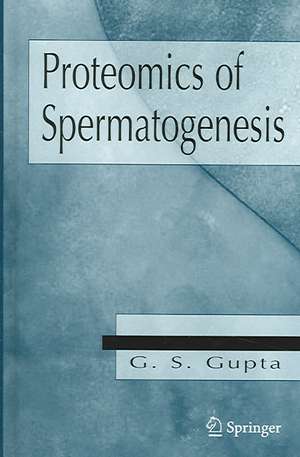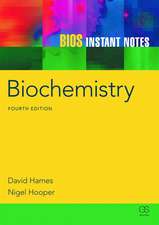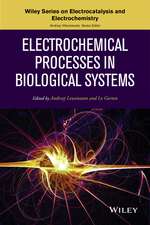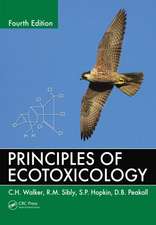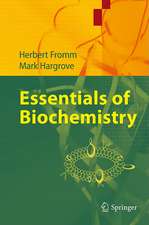Proteomics of Spermatogenesis
Autor G. S. Guptaen Limba Engleză Hardback – 25 mai 2005
Preț: 1248.83 lei
Preț vechi: 1522.96 lei
-18% Nou
Puncte Express: 1873
Preț estimativ în valută:
238.100€ • 248.59$ • 197.30£
238.100€ • 248.59$ • 197.30£
Carte tipărită la comandă
Livrare economică 14-28 aprilie
Preluare comenzi: 021 569.72.76
Specificații
ISBN-13: 9780387253985
ISBN-10: 038725398X
Pagini: 855
Ilustrații: XVI, 855 p.
Dimensiuni: 170 x 244 x 46 mm
Greutate: 1.34 kg
Ediția:2005
Editura: Springer Us
Colecția Springer
Locul publicării:New York, NY, United States
ISBN-10: 038725398X
Pagini: 855
Ilustrații: XVI, 855 p.
Dimensiuni: 170 x 244 x 46 mm
Greutate: 1.34 kg
Ediția:2005
Editura: Springer Us
Colecția Springer
Locul publicării:New York, NY, United States
Public țintă
ResearchDescriere
Recent developments of experimental techniques in cellular and molecular biology have made it possible to understand the molecular biology of male gametogenesis in greater detail. This book focuses on the description of specialized proteins, which are dominantly and/or specifically expressed in germ cells and localized in spermatozoa. There is an urgent need to classify proteins of spermatogenic cells with a view of their functions, and their applications in the regulation of fertility and in understanding infertility. The understanding of structural properties of male germ cell specific proteins can offer vulnerable points for targeted intervention in testis without generalized effects on stages of spermatogenesis. Besides targeted action in male germ cells, sperm specific proteins and polypeptides may also offer potential application in the development of a contraceptive vaccine.
Cuprins
1. Spermatogenesis.2. Paracrine Role of Sertoli Cell. 3. Non-Steroidal Signal Molecules in Spermatogenesis. 4. Specificity of Retinol, Estrogen and Steroid Linked Proteins. 5. Homeostasis of Germ Cells and Apoptosis. 6. Nuclear Skeleton Proteins: Non-Histones. 7. Nuclear Skeleton Proteins: Chromosomal Basic Proteins. 8. Microtubules. 9. Microtubule Based Motor Proteins. 10. Sex Chromosomal Proteins and Autosomal Homologues. 11. Cell Cycle Components. 12. Isoproteins in DNA Synthesis. 13. DNA Repair and Recombination. 14. Transcriptional Control. 15. Proteins in Transcriptional Activity of Spermatogenic Cells. 16. Transcription Factors Associated with Spermatogenesis. 17. Proto-Oncoproteins. 18. G Proteins and Associated Signal Transduction Molecules. 19. Protein Kinases. I. Serine/Threonine Kinases. II. Protein Tyrosine Kinases. III. Dual Specificity Protein Kinases. 20. Protein Phosphatases. I. Serine/Threonine Kinases. II. Protein Tyrosine Phosphatases. III. Dual Specificity Protein Phosphatases.21. Ion Channels and Aquaporins. 22. Action of Phospholipases. 23. Acrosomal Enzymes. 24. Acrosomal Proteins (Non-Enzymatic). 25. Actions and Myosins. 26. Cell Adhesion Proteins. 27. Metalloproteases and Metalloprotease Inhibitors. 28. Isoenzymes in Energy Pathways. 29. Fibrous Sheath, Dense Fibers, and Plasma Membrane of Sperm. 30. Proteins in Antiperoxidation. 31. Quality Control of Germ Cell Proteins. I. Ubiquitination and Proteolysis. II. Molecular Chaperons.32. Cancer Associated Testis Antigens. 33. Selective Group of Germ Cell Specific Proteins. 34. Sperm Maturation in Epididymis. Index.
Notă biografică
Dr. Gupta is a former Professor and Chairman of the Department of Biophysics, Panjab University, Chandigarh, India. His primary areas of research are molecular and cellular biology, reproductive biology/reproductive immunology, enzymology/enzyme technology, and radiation biology.
As a visiting researcher, he has worked at many institutions, including Northwestern University in Evanston, IL, the Center of Immunopathology and Experimental Immunology, INSERM, and the Center of Cytogenics and Immunogenetics, INSERM.
He has been honored by various Indian agencies such as Council of Scientific and Industrial Research (CSIR), University Grants Commission (UGC), Indian Council of Medical Research (ICMR), and Department of Science and Technology (DST).
Professor Gupta has made significant research contribution in the field of Reproductive Molecular Biology and Molecular Radiation Biology and published 120 original research articles and reviews in international journals.
He is the recipient of several awards and international fellowships including a WHO fellowship and the INSERM fellowship. Indian Council of Medical Research has honored him by conferring Swaran Kanta Dingley Oration Award of 1993 for his research contribution and extending knowledge in male reproduction. Associated with several national and international scientific societies, he has chaired scientific sessions and delivered invited lectures at national and International conferences.
Professor G.S. Gupta holds master’s degrees in Physical Chemistry and Biochemistry from Lucknow University, Lucknow, and a Ph.D. in Biophysics from Panjab University, Chandigarh (India).
As a visiting researcher, he has worked at many institutions, including Northwestern University in Evanston, IL, the Center of Immunopathology and Experimental Immunology, INSERM, and the Center of Cytogenics and Immunogenetics, INSERM.
He has been honored by various Indian agencies such as Council of Scientific and Industrial Research (CSIR), University Grants Commission (UGC), Indian Council of Medical Research (ICMR), and Department of Science and Technology (DST).
Professor Gupta has made significant research contribution in the field of Reproductive Molecular Biology and Molecular Radiation Biology and published 120 original research articles and reviews in international journals.
He is the recipient of several awards and international fellowships including a WHO fellowship and the INSERM fellowship. Indian Council of Medical Research has honored him by conferring Swaran Kanta Dingley Oration Award of 1993 for his research contribution and extending knowledge in male reproduction. Associated with several national and international scientific societies, he has chaired scientific sessions and delivered invited lectures at national and International conferences.
Professor G.S. Gupta holds master’s degrees in Physical Chemistry and Biochemistry from Lucknow University, Lucknow, and a Ph.D. in Biophysics from Panjab University, Chandigarh (India).
Textul de pe ultima copertă
Recent developments of experimental techniques in cellular and molecular biology have made it possible to understand the molecular biology of male gametogenesis in greater detail. This book focuses on the description of specialized proteins, which are dominantly and/or specifically expressed in germ cells and localized in spermatozoa. There is an urgent need to classify proteins of spermatogenic cells with a view of their functions, and their applications in the regulation of fertility and in understanding infertility. The understanding of structural properties of male germ cell specific proteins can offer vulnerable points for targeted intervention in testis without generalized effects on stages of spermatogenesis. Besides targeted action in male germ cells, sperm specific proteins and polypeptides may also offer potential application in the development of a contraceptive vaccine.
Researchers in the fields of biochemistry, cell biology, molecular biology, reproductive biology and proteomics will find this book of interest.
"This book is far superior to any previous book on the subject. I recommend this book with great enthusiasm."
Pawan K. Singal
St. Boniface General Hospital Research Center
Researchers in the fields of biochemistry, cell biology, molecular biology, reproductive biology and proteomics will find this book of interest.
"This book is far superior to any previous book on the subject. I recommend this book with great enthusiasm."
Pawan K. Singal
St. Boniface General Hospital Research Center
Caracteristici
There is an urgent need to classify proteins of spermatogenic cells with a view of their functions, and their applications in the regulation of fertility and in understanding infertility. The understanding of structural properties of male germ cell specific proteins can offer vulnerable points for targeted intervention in testis without generalized effects on stages of spermatogenesis
Besides targeted action in male germ cells, sperm specific proteins and polypeptides may offer potential application in the development of a contraceptive vaccine in males and females. Therefore, this monograph will focus on the description of specialized proteins, which are dominantly and/or specifically expressed in germ cells and finally localized in spermatozoa
Besides targeted action in male germ cells, sperm specific proteins and polypeptides may offer potential application in the development of a contraceptive vaccine in males and females. Therefore, this monograph will focus on the description of specialized proteins, which are dominantly and/or specifically expressed in germ cells and finally localized in spermatozoa
